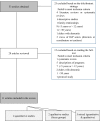Intergenerational programs: What can school-age children and older people expect from them? A systematic review
- PMID: 31543729
- PMCID: PMC6728408
- DOI: 10.1007/s10433-018-00497-4
Intergenerational programs: What can school-age children and older people expect from them? A systematic review
Abstract
Over the past 40 years, there has been a growing trend for intergenerational initiatives worldwide. Intergenerational programs (IGPs) aim to facilitate cooperation and exchange among different age groups. While most studies highlight the benefits for each generation, the programs and study designs vary widely. We conducted a systematic review of the scientific literature between 2005 and 2015 to: (1) characterize and define the IGPs studied and (2) identify the benefits for school-age children and older people aged 60 years or over. First, 53 articles with defined keywords were collected from online databases. Then, using inclusion and exclusion criteria, 11 articles were selected. These were classified according to methodological quality and were analyzed one by one. The content of the programs varied: three involved artistic activities, three educational activities, one health, three open-ended activities, and one was organized around a citizen's project. Concerning the benefits of IGPs for children and older adults, some studies highlighted significant differences in positive attitudes, behaviors, confidence, and competence for the children, and significant differences in mental and physical health, and quality of life for older adults. However, it should be noted that those benefits are not systematic. Our findings are discussed in the light of the meaningfulness of the activities and the role of IGPs, organization of the program, and participants' knowledge of the other generation. Future studies may wish to consider searching for additional variables to further refine our understanding of the benefits for participants.
Keywords: Benefits; Children; Intergenerational programs; Older adults; Systematic review.
Figures
References
-
- Allport GW. The nature of prejudice. Cambridge: Addison-Wesley; 1954.
-
- Ayala JS, Hewson JA, Bray D, Jones G, Hartley D. Intergenerational programs. J Intergener Relatsh. 2007;5(2):45–60.
-
- Belgrave M. The effect of a music therapy intergenerational program on children and older adults’ intergenerational interactions, cross-age attitudes, and older adults’ psychosocial well-being. J Music Ther. 2011;48(4):486–508. - PubMed
-
- Biggs MJG, Knox KS. Lessons learned from an intergenerational volunteer program: a case study of a shared-site model. J Intergener Relatsh. 2014;12(1):54–68.
-
- Bland CJ, Meurer LN, Maldonado G. A systematic approach to conducting a non-statistical meta-analysis of research literature. Acad Med J Assoc Am Med Coll. 1995;70(7):642–653. - PubMed
Publication types
LinkOut - more resources
Full Text Sources
Miscellaneous


